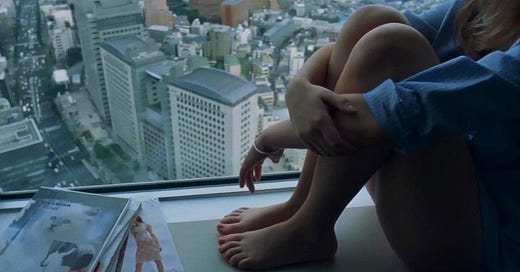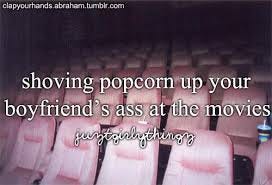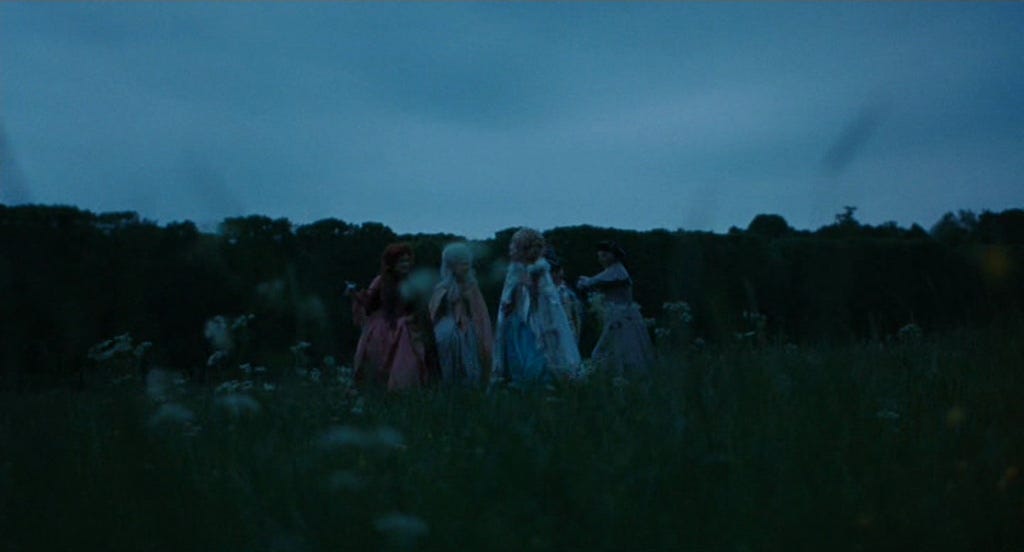I don’t know what it means to be a woman. Maybe I watch so many films about us, read about us, think excessively about us because I am always in the process of determining that definition, even if I never stop determining what it means for me. It can be difficult to find something that resonates. I often find more that speaks to me in a Sofia Coppola film or an Eve Babitz novel than I do in conversation with other women in my real life. Sometimes I worry that I’ve romanticized any suffering (though minimal [or maybe I’m diminishing it to seem more relaxed]), connecting womanhood to sadness instead of empowerment, that bright pink HR-friendly abstraction that has become the primary mode of rationalizing womanhood for many. Perhaps that’s why I take everything too seriously, force myself to make distant jokes about it, while simultaneously rejecting notions of girl power, of anything approaching a divine feminine.
The past year has given voice to an ever-evolving conversation about what it means to experience womanhood or, more accurately, what it is to be a girl and to have had a “girlhood.” I’ve already talked about this on my podcast over the course of multiple episodes, so I won’t rehash too much but I do feel suffocated by the framing of these conversations. I don’t begrudge anyone relating to what are, at the end of the day, mostly harmless TikTok trends: “Girl Dinner,” “Girl Math,” “Bimbofication1,” “Feminine Rage,” “Feral Girl Summer”; basically Just Girly Things revamped for another decade. 2023 felt at times like a ripening of the fruits girlboss feminism had been cultivating for the past two decades: Taylor Swift became a billionaire, Barbie broke box office records, Substack exploded with essays on all of these topics and more. Let’s be honest: If you’re on Substack regularly, this is probably feeling pretty stale.
I don’t like being labeled. I accept being called a woman, a girl, because I love playing at being a woman. Any natural feelings toward my gender are about presentation only. In the spirit of transparency, I was a boyish kid or, I guess, a cow-boyish kid. I wore boys underwear because it had Woody from Toy Story on it and putting a man, no matter how plastic and asexual, on girls underwear was apparently off limits. I asked to be Woody for Halloween when I was two, a choice that led to one of my earliest memories, a reckoning with my own gender presentation. As I tried on the costume, I realized that I looked like a boy. It filled me with a primal unease, a disgust flushing from my chest to my face like a fever, resulting in hot tears that flowed down to my cowboy boots. We returned the costume that weekend and I got an Alice in Wonderland costume instead, the blue dress and blonde wig, something I felt good in.
It’s easy for me to sympathize with those who decided on a gender, one that matches their sex or otherwise, because I’ve often felt like I made a conscious choice to be a girl through that Halloween debacle. It’s a desire, one deeply felt, to play with my femininity and be part of some kind of amorphous global sisterhood. I do think, as much as it can be, that this is something inherent in me, not learned.
And yet, I find it hard to understand what people are talking about when they describe what are, apparently, universal female experiences. Sure, I eat shredded cheese from the bag sometimes and I do happen to be bad at math, but I struggle to connect this to my feelings around my gender. If I do force myself to draw the lines, I don’t particularly like what I see: Hormonal imbalances and ingrained gendered stereotypes. I don’t want my identity to be tied to things that I eat, things that I can’t do, or the negative emotions I (very often) feel.
I have tried to universalize my life and I have failed. My childhood, my girlhood as we’ve started calling it, was generally a good one. The friends I made, the people I was a girl with, provided me with memories I find hard to compare to anyone else’s. They’re too precious to want to compare, even if I could. There is no “universal girlhood” because each girls childhood is hers alone. Our feelings of isolation in processing our individual pasts is proof enough of this.
What we do have in common isn’t necessarily innate; we watched the same shows, experienced many of the same events (9/11, the Wall Street crash, Covid), and have all been perceived through the lens of our gender by others (something that doesn’t require being born female, by the way) and were therefore treated “like a girl.” These commonalities are external, but they’re enough to tie anyone together, though the knots are loose and more generational than gendered.
However, the particular focus on girlhood and being a girl, not a woman, feels more like a scapegoat than a genuine meditation on growing up. To be clear, I don’t really believe that most people who post about being a “twenty four year old teenage girl” are being serious. It’s a joke at the expense of the staidness of adulthood, not a betrayal of their feelings toward womanhood. If it is, it would be about the pressure to live a particular version of that womanhood. Adult girlhood, to me, is allowing yourself space to be attentive to the things that have always brought you joy, refusing to give those things up just because you’re an adult. It’s being forgiving of yourself when you fuck things up because you’re still learning and always will be learning. That being said, I worry that, in using infantilizing language, we’re training our brains to see ourselves as overgrown children. It’s one thing to honor your inner girl and another to let her claim permanency.
Hand in hand with this trend is the tendency to pick a “girl” aesthetic, with such hits as “tomato girl,” “clean girl,” “coastal grandma,” et al. I can’t help but associate this kind of aestheticizing, the “romanticize your life” ethos, with a specifically American brand of narcissism. Once again, I hate labels, so correct me if I’m overstepping here, but it appears to me that the point of these aesthetics is to buy a mountain of clothes and home goods that fit the ideal. It says nothing about you as a person, or even as a woman, just as a consumer.
All of this girl-typing and aestheticizing reminds me of our newfound need to organize all of our free-flowing undesirable, confusing behaviors into neater DSM-approved boxes.2 Do I have ADHD? Autism? Bipolar disorder? Social media has told me I have all three. I’m afraid we may be pathologizing womanhood the same way, breaking it down into easily “diagnosable” traits so as to tell the world that we do, in fact, identify with our own gender. We’ve made ourselves neurotic with the desire to feel apart of something, to lay claim to something we’ve been told is a defining characteristic: Our gender. It feels good to have someone tell you what you are, doesn’t it? Until you stop agreeing with them, anyway.
It’s all too easy to feel severe displacement within your body when the world around you is asking you to consolidate your needs, optimize your life, eat less, work more, look at the phone, turn your brain off. I’ve been reading Emmeline Clein’s book on disordered eating, Dead Weight, and in the coda she posits the idea of “dissociative feminism.” Essentially, dissociative feminists are women who believe that things could be better but have lost the will to do anything about it. We (counting myself here) make gestures towards our beliefs with jokes and intentionally separate ourselves from those other feminists, the “hysterical” ones that talk so openly about their woman problems.
I may not be entranced by “girly-pop feminists,” if we’re giving them a name; the kind that defend themselves with “we’re just having fun” when accused of infantilization, that put choice (specifically consumer choice) above consequence, and think of gendered issues only in terms of what it means about their identity. However, I have my own problems. I do separate myself from women who take the feminist cause very seriously because it has fallen out of fashion to do so.3 I may think about being a woman every day, I might be doing the reading, the Joan Didion, the Susan Sontag, the bell hooks, the Kate Zambreno, but I’m still choosing to dissociate myself from any real action. This may be because there is no real action4 besides choosing to live my life the way I want to, which is often at odds with what is expected of me, and this is a hard thing to do. But I think we all need to do it. You can’t be a girl forever, nor will you easily fit into anyone else’s box.
Back to the movies. What I like about Marie Antoinette, Sofia Coppola’s take on the French queen pre-decapitation, is that it gives voice to specific things that I’ve struggled with as a young woman entering adulthood. The relatability comes through in her difficulties adjusting to change, her awareness of the absurdity of social custom, her decisions made at the expense of what’s right in favor of a good time. Many disagree with me, finding the film vapid, forgiving of bourgeois excess, or just plain boring. It can be those things but so can my life, which is what makes it resonate, for better or for worse. That’s the thing about art: The thing you see the most of yourself in is hated by at least one thousand other people. I think this is good. No one needs to relate to your entire lived experience because no else’s lived experience will be exactly like yours. This is a good thing. It’s what makes other people so interesting, infuriating, and important. You’re one of them, too.
Actually, this one bothers me. I think the aesthetics are fun but it often veers into a belief that if you act dumb you can harness some kind of idiot girl power to manipulate men. You can’t do this. They know what you’re doing but they’ll still treat you like an idiot because you’ve given them permission to do so. Sorry!
Self-diagnosing can be a good first step to figuring out what actually is going on in your brain, but I discourage against assuming you have a neurological or personality disorder because a TikTok said that walking with your right foot before your left is a symptom of OCD. The only real symptom of OCD is identifying with Lena Dunham, which is something TikTok won’t tell you.
Being someone who talks about feminist issues in leftist spaces has been branded as a bit cringe, though it’s sort of seen as a nag to mention it. Guess that’s a bit sexist too!
Legal action, let’s be clear!








